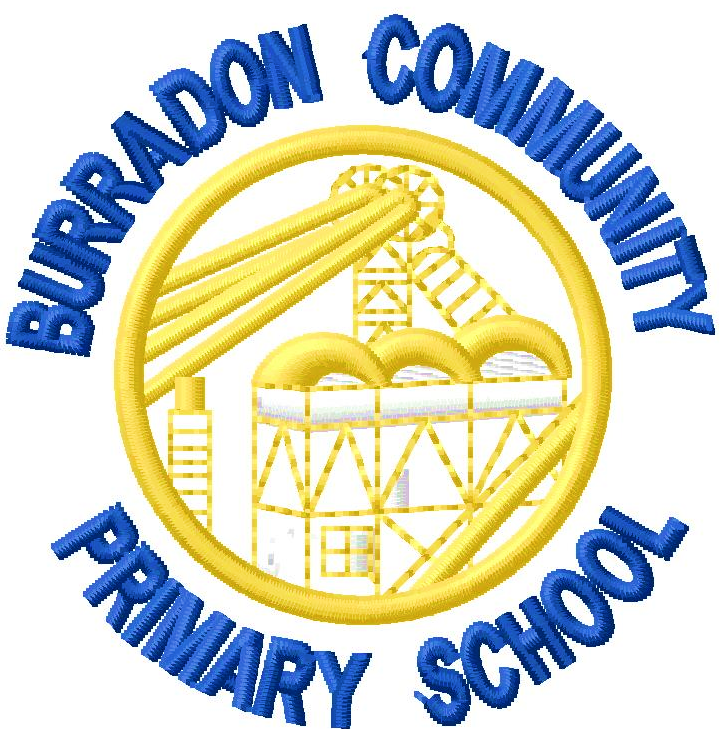Reading
Rationale
“At Burradon, we aim to develop reading skills with our pupils in order to improve their life chances, provide them with life skills and to promote reading for pleasure and enjoyment.”
Intent
At Burradon, we believe that reading is a fundamental life skill. We want them to develop a curiosity about, and respect for, the wider world by using reading as a tool to investigate, for themselves, the answers to their questions. Children are enabled to express themselves creatively and imaginatively as they become enthusiastic and critical readers of stories, poetry and drama, as well as of non-fiction and media texts. Children gain an understanding of how language works by looking at its patterns, structures and origins. It is our intention to ensure that all pupils read widely and confidently with fluency and comprehension appropriate to their age, so that they can develop a love of reading.
Our Key Principles:
- To provide a language rich environment that promotes a culture of reading and writing
- To develop in pupils an interest in and a love of books and literature that will not only support their learning across the curriculum but also enrich their lives
- To value and use books as a basis for learning, investigating, pleasure, talk and play
- To value and celebrate diversity in culture and language
- To help pupils become confident, independent readers, through an appropriate focus on phonics, word, sentence and text-level knowledge
- To develop enthusiastic and reflective readers, through contact with challenging and substantial texts.
Implementation
Reading in FS1 (Nursery)
As children enter nursery, staff begin to work on Phase 1 phonics following the Essential Letters and Sounds scheme of work. This involves helping children to identify and differentiate between specific sounds such as body sounds, instruments and sounds in the environment. The children are involved in activities such as rhyming and alliteration game to support their learning. As the year progresses, children are encouraged to hear initial sounds in words and begin to orally blend and segment.
Reading in FS2 (Reception)
At Burradon, we follow the 'Essential Letters and Sounds' (ELS) phonics scheme. In Reception, the children are taught Phases 2,3,4 and some of Phase 5 with the expectation that most children will be secure in these phases so that they are Year 1 ready.
The children are sent home with the 100 High Frequency words and phonic sounds, broken up into small sets, to read. They are checked weekly and words which the children can read are highlighted and new sets given out.
Reading books are matched carefully to the phonics phase that the children are working using the Oxford Reading Tree scheme. The children receive 1 book per week and keep this book for a full week with the expectation being that they re-read it to increase fluency and understanding.
All children are heard to read twice a week on a 1:1 basis with the class teacher or teaching assistant.
Reading in Key Stage 1
Our teaching of phonics through 'Essential Letters and Sounds' (ELS) continues into Key Stage 1. In Year 1, the children continue to learn phase 5 sounds which are mapped out in the weekly plans outlined by the scheme. Teaching is whole class based with teachers regularly assessing their children’s phonics ability. We follow the ELS guidance and aim for children to 'keep up not catch up' and therefore intervene with children who struggle during the phonics lesson. We have a dedicated teaching assistant who takes small groups in order to reinforce missing sounds and blending to read opportunities.
Children are also given the Year 1 and 2 Common Exception Words to take home and are frequently assessed on the reading of these words. Where appropriate, focused phonic sounds are also sent home for reinforcement.
Home reading books are carefully matched to each individual child’s phonic ability using the Oxford Reading Tree. Each child takes two books home for a week, rereading them to encourage familiarity, fluency and understanding.
All children are heard to read twice a week in a small group during guided reading and on a 1:1 basis with the class teacher or teaching assistant.
Reading in Key Stage 2
Reading in Lower Key Stage 2 continues to follow the Oxford Reading Tree. Those children who still need phonics reinforcement receive one phonics matched book per week and have a weekly booster session. However, most children have moved through these books and are now reading ORT books which are non-phonic based. It is the expectation that most children will be ‘free readers’ by the end of Year 4.
In Upper Key Stage 2, children are given the freedom to choose their own book to use as their reading book enables them to investigate and develop their own interests. All children are expected to change their books at least once a week unless they are choosing their own, as these books may require more time.
All children are heard to read at least once a week during small group guided reading sessions. All classes have dedicated reading lessons each week. These lessons involve a range of different activities and will often depend on the skills that the children need to focus on.
Reading Enrichment Activities
- Shared/Paired reading
- Reading House Afternoons
- Reading Buddy system
- Author visits
- Book Week (linked to World Book Day)
- Dress up as a favourite character
- Author focus during English lessons
- Book swaps
- EYFS/Key Stage 1 reading boxes to encourage reading for pleasure
- Access to school library
- Mobile library
- Classroom reading area
- Parent workshops in EYFS, KS1, LKS2 and UKS2
- Story time
EYFS:
Year 1:
Year 2:
Year 3:
Year 4
Year 5:
Year 6:
